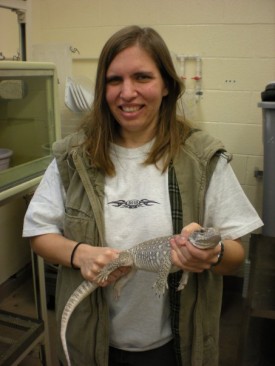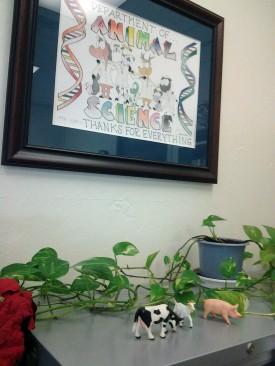
Amanda Szucsik with a Savannah Monitor Lizard, the main experimental model she studied in grad school.
The Department of Animal Sciences invites alumni to share their stories as they pursue their work or interests after graduation. The following is adapted from a story written by Amanda Szucsik, Class of 2001.
My name is Amanda Szucsik. I am 34 years old and was recently admitted (Class of 2018) to North Carolina State University’s College of Veterinary Medicine. NCSU is the only veterinary school in the U.S. to offer a focused, tracking curriculum in laboratory animal medicine. I am very, very excited to begin this next chapter in my life and can hardly believe that this dream is finally coming true!
I am firmly committed to the pursuit of a specialty in laboratory animal medicine post-graduation. I never would have arrived at this juncture in my life had it not been for the Rutgers School of Environmental and Biological Sciences’ Department of Animal Sciences.
I was born in Trenton, N.J., in 1979. Shortly thereafter, my immediate family relocated to Natick, Mass., a suburb just outside of Boston. As our extended family remained behind, I spent many a summer visiting grandparents, aunts, uncles, and cousins back in Jersey. I grew to have a great appreciation for the state and simultaneously recognized a precocial calling for a technical career involving animals. Once I knew that Rutgers, The State University of New Jersey, offered a course of study in Animal Sciences, this became my undergraduate program of choice.
From the moment I set foot on the Cook Campus, Rutgers provided me with a wealth of opportunities that benefited me in myriad fashion. The first of these were multiple hands-on experiences with a variety of animal species. I completed work-study assignments at the Poultry and Small Animal Research Facility (PSARF) as well as in the laboratory of Larry Katz, professor of Animal Sciences and now director of Rutgers Cooperative Extension.

This drawing by Amanda, which she presented to the Department of Animal Sciences when she graduated in 2001, still graces the walls of the department.
While on assignment at PSARF, I scraped the floors of goat pens, repaired fences, and painted buildings. Dr. Katz’s research assistant, Susan Becker, taught me to restrain white-tailed deer, perform phlebotomy, and analyze serum for hormonal contents. The Katz Lab was my first experience in research. I was privileged as a Cook student to enroll in many Animal Science-specific courses. Of course, Animal Science 142 (Intro to Animal Science; team taught) was a favorite, as was Animal Repro (taught by Carol Bagnell, professor) and Animal Nutrition (then taught by Dr. Patricia Schoknecht).
It was in Systems Physiology that I truly hit my stride and professional passion. Systems Phys was taught by Dr. Henry John-Alder (then faculty in the Department of Animal Sciences, now chair of the Department of Ecology, Evolution and Natural Resources). The laboratory was taught by Charles Kearns, a Ph.D. student in the laboratory of Kenneth McKeever, also an Animal Sciences faculty member. Charlie and I hit it off instantly, and he recruited me to assist on his dissertation project concerning the effects of Clenbuterol (a potent bronchodilator) on exercise performance/skeletal muscle physiology of Standardbred horses.
The times I spent in the Red Barn (i.e. Treadmill lab) were my happiest memories from Rutgers. I relished greeting the sun, arriving at the barn, and putting our retired mares through their paces on Rutgers Sato I high-speed treadmill. There are simply no words to describe the riveting experience of standing next to a horse galloping at full-speed during a VO2 (maximal exercise) assessment.
Following Dr. Kearn’s graduation from Rutgers, I continued in Dr. McKeever’s lab and completed my G.H. Cook Honors thesis under his direction. I investigated the effects of electrolytes on plasma acid-base homeostasis in Standardbred mares at rest and following exercise. This work resulted in my first peer-reviewed publication and jump-started my scientific career.
In my senior year, I was faced with a difficult decision: Do I apply to veterinary school (as originally planned), or do I pursue advanced studies in organismal physiology (a latent passion)? I decided in favor of graduate school and moved west to pursue a doctorate in Comparative Physiology in the Department of Ecology and Evolutionary Biology at the University of California Irvine.
Although I loved the conduct of scientific research, I was less than thrilled with the life of an academic scientist. I was suffocated by the competition for federal grants and crushed by the pressure to publish in top tier journals. As such, I made the excruciating decision to exit my Ph.D. in favor of a M.S. degree. I left UCI on good terms and worked in private industry for multiple years and later at the University of Utah.
My career in laboratory animal science has been very diverse. I have worked with horses, sheep, goats, deer, alligators, lizards, snakes, fishes, chickens, mice, rats, rabbits, and guinea pigs all in laboratory settings. I perform survival surgery, manage transgenic rodent colonies, and employ molecular techniques as daily responsibilities. I have exercised lizards on a treadmill, drawn blood from fish, and assisted on cardiac surgery in goats. Truly, I have enjoyed a blessed professional life. Thank you for all you have done for me, Department of Animal Sciences.

